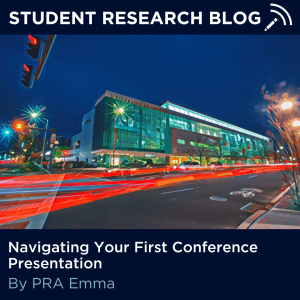By Emma Beard, Peer Research Ambassador
 Presenting your work is one of the most important skills a researcher can learn. One of the best ways to practice this skill and share your work with a large audience is attending a research conference. I had the opportunity to present my research at Cell Bio 2023, the American Society for Cell Biology’s annual meeting, in Boston this past December. Getting to present a poster at such a large conference was an incredible experience, but there were a few things I wish I had known going into the meeting that I hope others can learn from to make the most of their conference participation!
Presenting your work is one of the most important skills a researcher can learn. One of the best ways to practice this skill and share your work with a large audience is attending a research conference. I had the opportunity to present my research at Cell Bio 2023, the American Society for Cell Biology’s annual meeting, in Boston this past December. Getting to present a poster at such a large conference was an incredible experience, but there were a few things I wish I had known going into the meeting that I hope others can learn from to make the most of their conference participation!
1. Know your audience, especially when they are familiar with your field
This point may seem self-explanatory, but it was something I was unprepared for. Before Cell Bio 2023, I had only ever presented my research at poster sessions for UConn undergraduates like Frontiers. These events helped me develop skills in designing posters (maybe link https://ugradresearch.uconn.edu/wp-content/uploads/sites/323/2014/02/Poster-Preparation.pdf) and speaking about my research (maybe link https://ugradresearch.uconn.edu/wp-content/uploads/sites/323/2014/02/Poster-Prepare-Yourself.pdf), but since Frontiers is open to all fields of research, the way I presented was tailored to an audience less familiar with cell biology.
National or international conferences usually have a more specific focus. Cell biology is a very broad field, so not everyone was familiar with my research, but I was very excited to have a few people who worked in similar areas visit my poster! The only problem was that I had only practiced one version of my presentation that was geared towards a general cell biology audience. Whenever I gave this talk to someone in a similar field, they had many specific questions at the end that I likely could have addressed during the presentation if I had known their background. I think it would be helpful to get to know more about the people visiting the poster first to get a sense of their background, and also practice including or omitting specific details in the presentation based on each person’s research interests.
2. Research conferences are as much about sharing your own work as they are about learning from others’ work
I really wish that I had spent more time talking to other poster presenters or attending talks. At the beginning of the conference, I was so focused on presenting my own work that I forgot that all the other hundreds or thousands of attendees were doing so, too. It’s great to attend a conference to learn how to present your research, but you have to have someone to present to. If everyone were just sharing their own research and not listening to others, what would be the point of having a conference?
Getting to talk face to face with other researchers and exchange ideas was one of the most incredible and unexpected things about attending a conference. When I was presenting, I received suggestions on how to accomplish the next steps of my project, particularly techniques I had never even considered! In listening to others present, I gained a better understanding of current research and approaches I would have never thought to try. Unfortunately, I really only realized the value of this exchange of information towards the end of the conference and likely missed out on some incredible presentations. When you present at a conference, I really recommend taking the opportunity to explore other people’s work. You never know what you might learn!
3. There isn’t really an unspoken dress code
When I was packing clothes for the conference, I spent a long time searching the internet for what to wear. Most of the responses were mixed, but often listed business casual, and Google ads even recommended that I buy blazers. I was so stressed that the clothes I brought weren’t going to be nice enough. However, when I arrived on the first day of the conference, I was surprised to find that even in just slacks and a dress shirt, I felt overdressed. While some attendees were wearing more formal outfits, many people were in jeans and tee shirts! I wouldn’t necessarily recommend wearing jeans and a tee shirt to your first conference, but definitely don’t stress too much about how formal you need to be. Any outfit within the range of tee shirt to business attire will likely be just fine.
Attending a conference for the first time can be stressful, but it is an incredible experience! Especially as an undergraduate, it might feel overwhelming to present alongside established researchers, but I really encourage you to take the opportunity to present if you are able to. Even though there are many unknowns going into a conference, I hope some of these insights can help you feel a little more comfortable in attending.
Emma is a senior majoring in Molecular & Cell Biology and minoring in Physiology & Neurobiology. Click here to learn more about Emma.